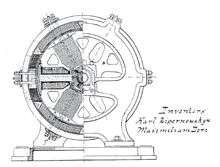Miksa Déri
Miksa Déri | |
|---|---|
 Déri Miksa | |
| Born | Miksa Deri 24 October 1854 |
| Died | 3 March 1938 |
| Nationality | Hungarian |
| Education | Technical University of Budapest Technical University of Vienna |
| Occupation | Engineer |
| Engineering career | |
| Institutions | Ganz Works |
Miksa Déri (27 October 1854 in Bács, Austrian Empire – 3 March 1938) was a Hungarian electrical engineer, inventor, power plant builder. He contributed with his partners Károly Zipernowsky and Ottó Bláthy, in the development of the closed iron core transformer and the ZBD model. His other important invention was the constant voltage AC electrical generator in the Ganz Works in 1883. The missing link of a full Voltage sensitive - voltage intensive (VSVI) system was the reliable AC Constant Voltage generator. Therefore, the invention of the constant voltage generator at the Ganz Works[1] had crucial role in the beginnings of the industrial scale AC power generating, because only these type of generators can produce a stated output voltage, regardless of the value of the actual load.[2]



ZBD was an abbreviation of the three men's names: Zipernowsky, Bláthy and Déri.
Déri is also noted for inventing the single phase type of repulsion motor[3]
Education
- There is a secondary school named after Miksa Déri in Mátészalka Hungary.
- There is a secondary school named after Miksa Déri in Szeged Hungary that offers courses preparing students for the engineering fields.
References
- ^ American Society for Engineering Education (1995). Proceedings, Part 2. p. 1848.
- ^ Robert L. Libbey (1991). A Handbook of Circuit Math for Technical Engineers. CRC Press. p. 22. ISBN 9780849374005.
- ^ Palgrave Macmillan Ltd (2016). Dictionary of Physics. Springer. p. 569. ISBN 9781349660223.
External links
- Hungarian Patent Office's Miksa Déri (1854 - 1938)
- Biography of Miksa Déri
